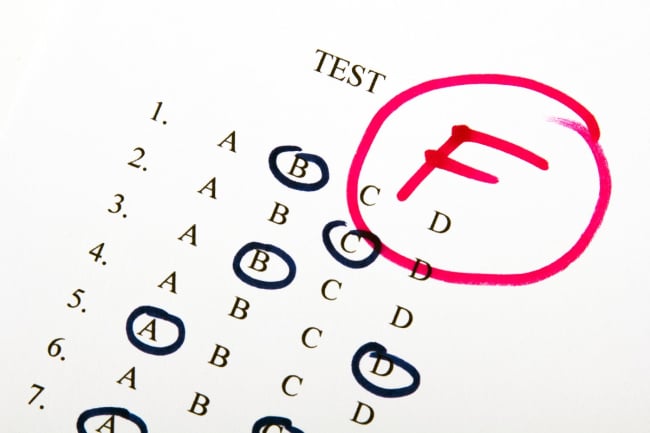You have /5 articles left.
Sign up for a free account or log in.

Grade-forgiveness policies, also known as grade-replacement policies, differ among institutions but generally let students retake a course in which they received a low grade.
iStock/Getty Images Plus
Students are more likely to enroll in science, technology, engineering and mathematics courses and graduate with a STEM degree when grade-forgiveness policies are in place, according to a recent study published by the National Bureau of Economic Research.
Grade-forgiveness policies, also known as grade-replacement policies, differ among institutions, but generally allow students to retake a course in which they received a low grade. The student’s new grade is then calculated into their overall GPA, and the old grade is tossed out.
The study, titled “A second chance at success? Effects of college grade forgiveness policies on student outcomes,” looked at the transcripts of more than 170,000 undergraduates who attended Boise State University between 1990 and 2017. The report claims to be the first to study the impact of college course-repeating policies on GPA.
Xuan Jiang, a postdoctoral researcher at Ohio State University and co-author of the study, said Boise State was an ideal subject, since its policy on retaking courses changed during the 20-year period.
Students who entered Boise State in 1990 had a grade-forgiveness policy in place, but in fall 1995 the institution switched to a more traditional grade-averaging policy. Then, in fall 2001, Boise State reversed course and went back to its earlier grade-forgiveness policy, the study explains. So the researchers were able to compare data from students who attended the same institution but under different grade-forgiveness schemes.
Notably, the study found that when Boise State operated under a grade-forgiveness policy, students were about 10 percent more likely to enroll in STEM courses. Among students who had not yet declared a major, the policy increased the likelihood of them enrolling in a STEM course by 10.6 percent.
Because grade-forgiveness policies give students insurance against a low grade, more students are willing to risk taking a harder course or majoring in a harder subject, including STEM, said Jiang.
“This more forgiving policy actually incentivizes students to challenge themselves,” she said. “So I think the thing that we find very striking is how much more likely students are to take harder courses when they have this safety net.”
That should reassure critics who see grade forgiveness as a license for students to slack off, said Jiang.
“They only worry [is] that students might slack off when they have this forgiveness policy,” Jiang said. “But they did not see that it also could benefit students by incentivizing them to challenge themselves.”
Students who repeat a course will enroll in 1.16 more credits in the same subject than students who don’t repeat a course, the study notes, suggesting that grade-forgiveness policies significantly improve students’ interest or persistence in a subject they have struggled with.
Additionally, the number of STEM graduates increased by 25 percent when grade-forgiveness policies were in place.
“In order to get more students to graduate in STEM, you have to get them to start on the STEM trajectory,” Jiang said. “So this policy incentivizes students who take more STEM courses at the very beginning, so they could have a chance.”
David Meeler, an associate professor of philosophy at Winthrop University in South Carolina, has researched grade-forgiveness policies, including in a 2013 study of eight public institutions. Meeler said he’s not surprised that grade forgiveness improves STEM retention, since those courses tend to be sequential. Without grade forgiveness, STEM students who do poorly in a class could be thrown off track in their course of study.
“You have to take Chem I before you take Chem II, and then you move on to organic chemistry,” Meeler said. “So if you’ve got a situation like that, and you need that grade forgiveness, you’re gonna want to use it so that you don’t get pushed back.”
Grade forgiveness can also help institutions keep students enrolled—especially in STEM, where students might be deterred if they do poorly in a course, Meeler said.
“I just think it’s an effective way for universities to address retention, particularly in those types of majors where if you mess up in one class, it might throw everything off for a whole year and make you even just leave your major or leave school,” Meeler said. “Increasing the grade forgiveness, to some extent, is increasing the second chances.”
Grade-forgiveness policies are increasingly popular among institutions, Jiang said. While she and her research team don’t have an exhaustive list, she estimated that 70 to 80 percent of land-grant universities have grade-forgiveness policies.
“I think they’re actually pretty widespread,” Jiang said. “In general, the timing of implementing these policies has been spread out, but there are more and more universities taking it up.”
While the COVID-19 pandemic didn’t necessarily compel institutions to adopt grade-forgiveness policies, Meeler said, it did pressure many to temporarily adjust their grading practices, in some cases by switching classes to pass-fail.
“When COVID first hit in the middle of semester a couple of springs ago, we went from being in class one week to being fully online a week later,” Meeler said. “Institutions were understanding that that kind of change has a real impact on how students are learning.”
For all the benefits of grade forgiveness, Meeler noted it does have the potential for misuse. Some students see it as an easy way to score a high grade rather than as a path to mastering the material. His 2013 study found that 5 percent of college seniors from one institution used grade-forgiveness policies to keep between 25 and 50 percent of their coursework from counting toward their GPA. Meeler said institutions are aware that students can take advantage of the policy, but he said the majority use it responsibly.
“Any university knows these policies come with costs, and as such, most students will not maximize their use,” Meeler said. “These policies can help those students keep their path, if not always keep to their timeline.”
Meeler also said grade forgiveness can exacerbate inequity among students, since not everyone can afford to retake a course or tack on an extra semester of college.
“Who has the greatest opportunity to make use of these forgiveness policies and stick around and add an extra semester or extra year?” Meeler said. “While it might make it possible for some students to kind of hang in there longer and ultimately succeed, it comes at a cost not everyone can pay.”




